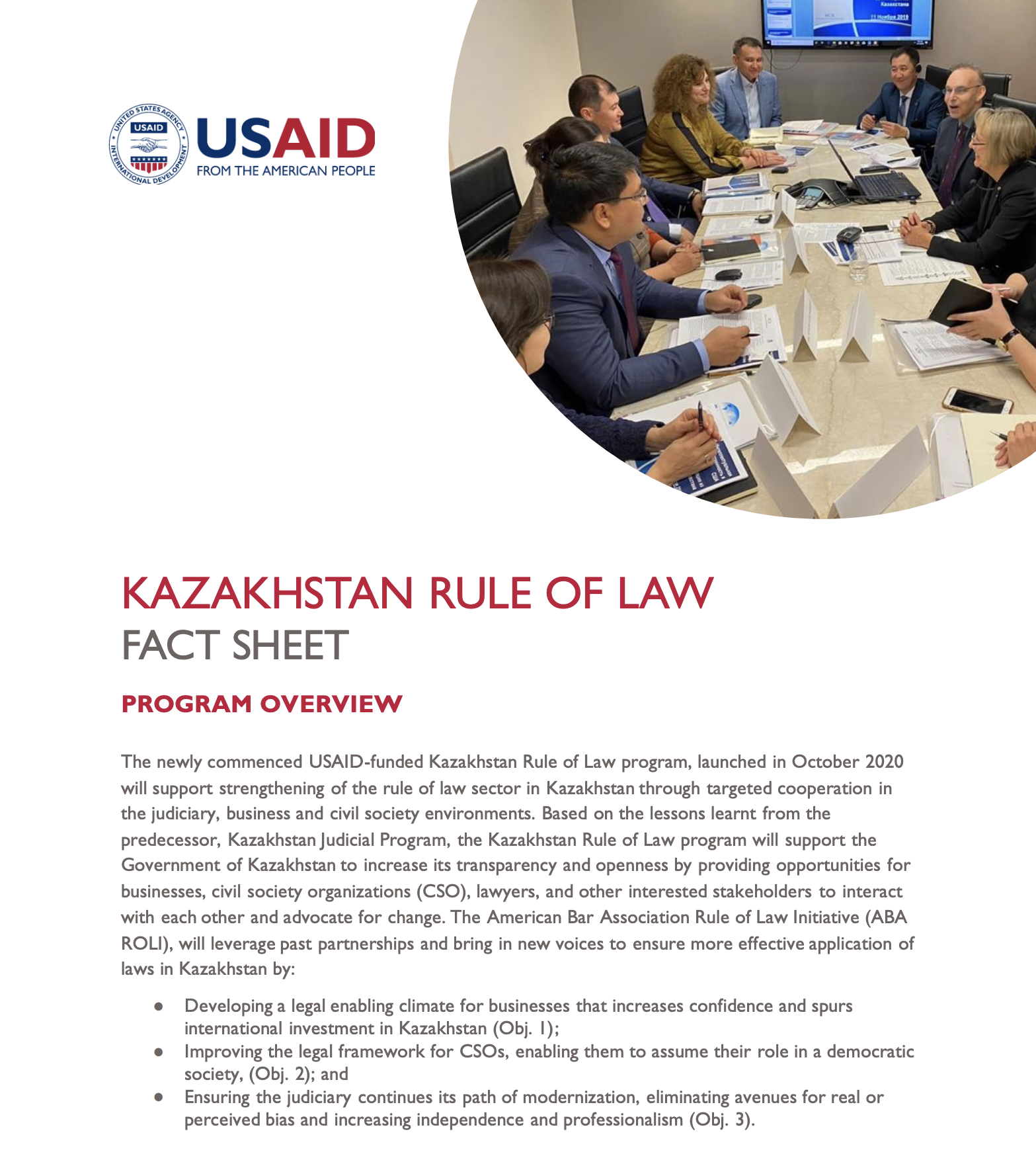Speeches Shim
Kazakhstan Rule of Law ![]() (pdf - 224k)
(pdf - 224k)
The newly commenced USAID-funded Kazakhstan Rule of Law program, launched in October 2020 will support strengthening of the rule of law sector in Kazakhstan through targeted cooperation in the judiciary, business and civil society environments. Based on the lessons learnt from the predecessor, Kazakhstan Judicial Program, the Kazakhstan Rule of Law program will support the Government of Kazakhstan to increase its transparency and openness by providing opportunities for businesses, civil society organizations (CSO), lawyers, and other interested stakeholders to interact with each other and advocate for change. The American Bar Association Rule of Law Initiative (ABA ROLI), will leverage past partnerships and bring in new voices to ensure more effective application of laws in Kazakhstan by:
- Developing a legal enabling climate for businesses that increases confidence and spurs international investment in Kazakhstan (Obj. 1);
- Improving the legal framework for CSOs, enabling them to assume their role in a democratic society, (Obj. 2); and
- Ensuring the judiciary continues its path of modernization, eliminating avenues for real or perceived bias and increasing independence and professionalism (Obj. 3).
Objective 1. Legal environment for Business
Strengthen the legal enabling environment for businesses
To ensure reforms in Kazakhstan continue at a rapid pace, ABA ROLI will leverage existing working relationships with the Supreme Court, Academy of Justice, National Chamber of Entrepreneurs, bar associations, and the business community to support necessary reforms to business laws in Kazakhstan.
PURSUED OUTCOMES OF THE ACTIVITY:
- Legislation related to investments clarifies court proceedings, increasing court effectiveness;
- Foreign investors increase their confidence and trust in investment dispute resolution proceedings in Kazakhstan;
- Through access to technical courses, judges are able to improve their knowledge on topics related to the business enabling environment;
- Court administration reforms increase court effectiveness and efficiency, encouraging investment disputes to be resolved through local investment panels.
Objective 2. Legal environment for Civil society
Strengthen the legal enabling environment for civil society organizations
Under this objective ABA ROLI will provide support to the Kazakhstan government in drafting and implementing legislation while increasing the opportunities for CSOs, lawyers and government entities to connect with one another and better demonstrate value to each other. Moreover, ABA ROLI will provide a ground for learning and professional development of CSOs’ staff members in to ensure their compliance with rights and obligations under the law.
PURSUED OUTCOMES OF THE ACTIVITY:
-
Government entities and civil society improve their ability to draft, review and comment on legislation through increased opportunities for cooperation and coordination;
-
International expertise and stronger capacity improves the ability of the Government of Kazakhstan to implement CSO-related legislation;
-
CSOs strengthen their awareness of their rights and responsibilities.
Objective 3. Judicial impartiality and independence
STRENGTHEN THE INDEPENDENCE AND PROFESSIONALISM OF THE JUDICIARY
To promote an independent, accountable, well-functioning judiciary as a central pillar of the rule of law and access to justice, the Kazakhstan Rule of Law program will conduct select activities to strengthen independence and professionalism of the judiciary. Activities will include legislative analysis and detailed and practical expertise on international standards on the independence of the judiciary. ABA ROLI will strengthen the independence and professionalism of the judiciary in cooperation with the Supreme Court, the Union of Judges, the Academy of Justice, and other stakeholders.
PURSUED OUTCOMES OF THE ACTIVITY:
-
Strengthened judicial processes through increasing public trust in and perception of the judiciary;
-
Judicial education to increase the professionalism of the judiciary;
-
Specificity and clarity in application of the Code of Ethics will ensure a strong and independent judiciary;
-
Introduction of new court practices will ensure a sustainably independent and professional judiciary.


Comment
Make a general inquiry or suggest an improvement.